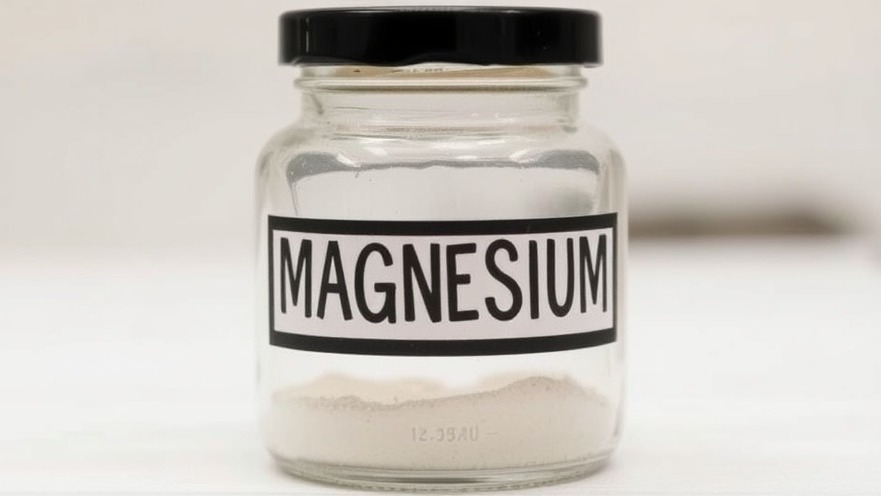
Understanding Magnesium Deficiency: A Hidden Health Threat
As we age, our bodies become increasingly susceptible to nutrient deficiencies that can have profound effects on health. One such deficiency, often overlooked, is magnesium deficiency. In the video titled The MOST Dangerous Sign Of A Magnesium Deficiency, experts shed light on the critical signs and symptoms that indicate a deficiency of this essential mineral, and why it matters. Magnesium is vital for many bodily functions, including energy production, bone health, and muscle function.
In the video titled The MOST Dangerous Sign Of A Magnesium Deficiency, the discussion dives into the critical signs of magnesium deficiency, spotlighting the need for awareness in our daily health routines.
Why Is Magnesium Important?
Magnesium plays a crucial role in over 300 biochemical reactions in the body. It's like a silent partner in our health routines, contributing to muscle contraction, blood sugar regulation, and even the synthesis of DNA and proteins. Unfortunately, many individuals aged 50 and over may not be getting enough magnesium due to dietary changes or absorption issues common in older adults. This deficiency can lead to serious health implications if not addressed.
Are You Experiencing These Warning Signs?
Among the primary indicators of magnesium deficiency are fatigue, muscle cramps, and mental health issues like anxiety and depression. People often misinterpret these signs as part of aging but they could very well indicate a nutrient deficiency. Feeling persistently fatigued? It might be time to evaluate your magnesium levels. Even minor symptoms can signal a more significant underlying deficiency.
The Vital Connection Between Magnesium and Mental Health
For individuals over 50, mental wellness is paramount. Emerging research links magnesium levels to mood regulation. Low magnesium levels are associated with increased feelings of anxiety and depression. If you find yourself feeling more anxious or down than usual, it might not be just life stresses. Increasing your magnesium intake—whether through supplements or food—could make a positive difference.
Foods Rich in Magnesium: Nature’s Solution
The good news is that increasing magnesium intake can be achieved naturally! Foods rich in magnesium include leafy green vegetables, nuts, seeds, and whole grains. For example, a simple snack mix of almonds, pumpkin seeds, and spinach can provide a substantial magnesium boost. Opting for a diet high in these foods is not only beneficial for magnesium levels but also enhances overall nutrition.
How Supplements Might Help
For those struggling to meet their magnesium needs through diet alone, supplementation may be a beneficial option. Magnesium supplements come in various forms, including magnesium citrate and magnesium glycinate, both recognized for their bioavailability and effectiveness. However, it’s essential to consult with a healthcare professional to determine the appropriate dosage and form for individual needs. This personalized approach can help prevent potential side effects and optimize absorption.
Addressing Common Misconceptions About Magnesium Deficiency
One common myth is that supplementation is unnecessary if you eat a balanced diet. However, factors like soil depletion, digestive health, and age can significantly affect nutrient absorption. It's not just about eating magnesium-rich foods; how your body processes those nutrients is equally important. People over 50 often face these challenges, which can lead to notable deficiencies.
Taking Action: Simple Steps to Improve Your Magnesium Levels
So what can you do? Start by incorporating magnesium-rich foods into your daily meals. Aiming to include a source of magnesium in every meal can help. For example, add spinach to your morning smoothie, snack on nuts during the day, and swap out white rice for quinoa at dinner. Beyond dietary changes, consider having your magnesium levels checked through a blood test if you suspect a deficiency.
Final Thoughts: The Importance of Awareness
With the information shared in The MOST Dangerous Sign Of A Magnesium Deficiency, there’s a clear call to pay attention to our bodies and listen to what they are telling us. Magnesium deficiency can lead to significant health issues, especially as we age. By being proactive about our nutrition and considering supplementation where necessary, we can promote better health and longevity. Understanding these warning signs is the first step towards a healthier, more vibrant life.
Embrace the journey to better health by taking small yet impactful steps. Start focusing on nutrient-dense foods and consider reaching out to your healthcare provider for personalized advice on magnesium intake.
 Add Element
Add Element  Add Row
Add Row 



Write A Comment